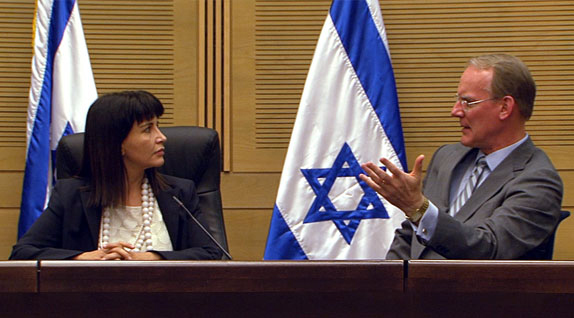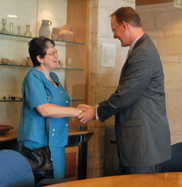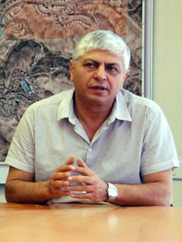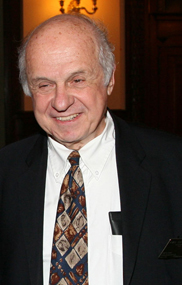 Moo-V Group
Moo-V Group
Article
The Mid-East democratic nation is evaluating its position in a fast-changing region.
Learn the why behind the headlines.
Subscribe to the Real Truth for FREE news and analysis.
Subscribe NowThe history of the modern nation called Israel is a story of adversity, controversy and prevailing against overwhelming opposition. When it declared independence after the British Mandate for Palestine ended following World War II, surrounding countries immediately declared war on the emerging state. The outcome—victory for Israel against steep odds—is still called al-nakba (“the catastrophe”) by many Arabs.
A number of military engagements followed. The Suez Crisis (1956), the Six-Day War (1967), the Yom Kippur War (1973), a number of conflicts with Lebanon, the Intifadas, and others—each one demonstrated Israelis’ resolve to hold on to what many of them consider their ancestral homeland, as documented in the Old Testament.
 The Real Truth
The Real TruthOver these decades, Israel has maintained or gained control of two areas that some view as belonging to others: the West Bank, home base of the Palestinian Fatah movement, and the Golan Heights, once part of Syria.
Now Israel, having never had broad international support, faces weakening ties with existing allies and a renewed round of challenges to the legitimacy of its current borders, carved out in the aftermath of the Six-Day and Yom Kippur wars. Meanwhile, many of its Mid-East neighbors are in the midst of upheavals, toppling iconic leaders who have been in office for decades.
What will the months ahead, in a new Middle East, hold for the state of Israel?
Palestinian Statehood
Israel’s Mid-East relations range from a longstanding truce with Jordan to openly hostile rhetoric from Iran. But its closest “foreign” neighbors, the Palestinians, are within its own post-1967 borders.
Many Palestinians also view control of Jerusalem and the West Bank as their birthright. For some, this territory encompasses all of Israel. As a result, September 2011 will likely see a push for Palestinian statehood through a United Nations resolution.
In an exclusive interview with Real Truth Editor-in-Chief David C. Pack at the Knesset, MK Dr. Einat Wilf discussed her view of the implications: “The Foreign Affairs and Defense Committee, of which I am a member, has been throughout the last few months carrying out quite a few discussions about September with numerous experts of legal and international law, just to understand what this could mean for Israel.”
 The Real Truth
The Real TruthDr. Wilf explained that Israel is approaching the prospect of Palestinian statehood by trying to prevent it completely, which appears unlikely. She said that while the nation already has support from Canada and the U.S., it is now undertaking the more difficult task of convincing Europe. Backed by these nations, she stated, Israel will be in a better position to oppose the measure.
“We can appreciate that the United States does not want to be stuck alone at a moment where there’s a sense that the world supports a Palestinian state. There’s great desire for both sides to negotiate. Right now the sense is that the government is generally passive. [Some argue] that this is intentional, this passivity—that the prime minister realizes that if any breakthrough is ever going to happen, it has to happen through a sense of being coerced into it rather than having initiated it…In general, I think both Israelis and Palestinians prefer their leaders not to go into the negotiations too enthusiastic. If they go into them ‘kicking and screaming,’ I think we have a greater sense of trust that they represent our interest.”
Dr. Wilf referenced a 2011 speech by Israeli Prime Minister Benjamin Netanyahu to the U.S. Congress, in which he explained that the core of the issue “has never been the existence of a Palestinian state, it has always been about the existence of a Jewish state.” She explained that there is “still a fundamental denial and willingness to accept that the Jewish people have a historical connection to this place” and “they have the right to self-determination by virtue of this bond in this land. This is still completely denied and rejected by our neighbors. Even when they’re willing to come to terms with us, [it’s] because we exist, because we are strong, not because they acknowledge the historical bond.
“So the efforts to undermine Israel, to annihilate Israel, over the years took numerous forms. Military, terrorism, economic strangulation through the Arab boycott, and all of these have failed. Israel was able to ultimately defeat all the militaries and make it clear that conventional war is not going to be the way to defeat Israel. It has been able to contain terrorism to the point that the Israeli public is no longer terrorized and even in terms of economic strangulation, Israel has been able to make itself into an island.
 Shahar Azran Photography, LLC
Shahar Azran Photography, LLC“If you look at the trade patterns of most countries, they tend to trade with the countries around them. If you look at the trading patterns of Israel, it would be an island in the middle of the Atlantic, between Europe and then North America. Even though recently we started to trade more with China and India, Israel has been able to build this strong, innovative, export-based economy that has nothing to do with the region—actually annul[ling] the effects of the Arab boycott.
“What we’re seeing is that the efforts to undermine Israel do not end every time that Israel wins. They just move somewhere else. ‘If it’s not the military, we’ll try terrorism. If it’s not terrorism, we’ll try economics. If it’s not economics, let’s go to the international legal arena where we have automatic majorities, where the language of human rights has been subverted pretty much to single out Israel for anything.’ What we’re seeing is that the conflict in recent years has been moving more and more into this arena, I call it, of the media, of consciousness, of images. But the conflict continues. It’s non-violent, which is good. But it’s still very fierce and it takes place in NGOs and supermarkets and academia and international bodies and criminal courts. I think the notion is that for those who continue to reject Israel, they feel that this is a place where they have at least a level playing field, if not a strong advantage. So I think really by going to the UN in September, the Palestinians will be getting the legal basis for which to continue to attack Israel with numerous legal and international forums.
“I think September will mark a key point, and the process has been going on for a while, in the transference of the arena of conflict from the military, terrorist, violent, economic one to one of international law, images, media, human rights law. This is really what it’s all about…What they will be getting is the ability to continue the conflict in an arena where they feel strong.”
Contested Capital
The Israel/Palestine quandary has the nation’s capital divided by lines, zones, ethnicities and ideologies. In an interview with The Real Truth, Jerusalem Deputy Mayor Naomi Tsur described the diverse mix of her city’s residents: “The Arab community, the Jewish community…you have immigrants, people that came from the former Soviet bloc…you have the Ethiopian community. A real melting pot and gathering of exiles to form this wonderful mosaic which is Jerusalem, and that brings with it tremendous economic challenges…
“We have a city with about 800,000 residents and when we analyze it in terms of a modern city to run, we have tremendous challenges…a city within this complex and diverse population in the eye of a geopolitical storm—which was already going on in King David’s time and which is unlikely to calm soon…[there has been an] awful lot of suffering. It’s layer upon layer of building and destruction. A city that has been destroyed countless times, which has always reemerged with a new strength, and which has a beauty that has [endured].”
Economic challenges are not the only kind that Israel faces. Terrorist attacks from radical elements in the Gaza Strip and the West Bank led the nation to erect over 300 miles of security fence, which in a few years became a wall in certain sections. While this fence is controversial, it is hard to dispute the results: Israeli deaths by terror attacks have been reduced to a small fraction of what they had been.
Ms. Tsur went on to discuss the human side of Jerusalem’s security challenge: “People from Palestinian territories [coming] into Israel are checked very thoroughly…and it’s one of the saddest moments of the day for many of us. Because I would love not to have to be checked very thoroughly. I would like to have free movement. I remember when [former Israeli Foreign Minister] Moshe Dayan had the idea of opening up the passage from Israel through the Palestinian territories to Jordan, and it was a wonderful vision of a new Middle East where everyone could live together. But we can’t allow that.
“It’s not that [Palestinians] can’t come through. They have to be checked before they come through. We have too many tragic cases in the past that show that we need to keep up this security fence, which we would all like to pull down, because good fences don’t make good neighbors. These are some of the stark realities of our time and our area.”
Expansion Frozen
The disputed status of the West Bank has led to intense international pressure on Israel to halt any new construction in this area. This in turn has housing in short supply—no small problem in a society that, according to a 2006 Gallup poll, considers about four children per family the ideal number. The cost of housing there has dramatically increased, sparking widespread demonstrations by young Israelis.
This dynamic is embodied in Ma’ale Adumim, a town of about 37,000 established in the Judean desert in 1991. In a tour and meeting hosted by Mayor Benny Kashriel, Mr. Pack and several Real Truth writers took in the beauty of what is referred to as a settlement. Its immaculate residences, parks, greenery, roads and commercial areas could pass for an affluent suburb of Los Angeles or Miami. This is made all the more remarkable by the fact that it was built on scrub desert terrain—almost a humanly engineered foreshadowing of the biblical prophecy of the desert blossoming like a rose (Isa. 35:1).
But Ma’ale Adumim has been frozen in its tracks. After a visit from the American Secretary of State in the early 2000s, American diplomatic pressure came to bear and building was eventually halted, with partially finished structures sitting empty across the street from inhabited homes.
Friction with Longtime Ally
For decades, one of the bright spots in Israel’s foreign relations was its friendship with Turkey, the first primarily Islamic nation to recognize Israel in 1949. But the 2010 Gaza flotilla incident, in which eight Turkish citizens and one Turkish-American were killed, began a chain of events that led to Israel’s Ambassador to Turkey being expelled on September 5 of this year. Turkish Prime Minister Recep Tayyip Erdogan also hit Israel with sanctions and threatened further punitive action.
Turkey’s decision elicited praise from some corners of the Middle East and beyond, and grave concern from the United States.
“The breakdown of the relationship is fraught with complications for the US, which for decades has made expensive military, diplomatic and economic investments in both countries,” Financial Times reported. “Since the 1979 Islamic revolution in Iran, Turkey and Israel have been the linchpins of US policy in the region.”
The Real Truth discussed the regional dynamic with Ambassador Uri Bar-Ner, Israel’s diplomat to Turkey from 1998-2001. Born in the land called Palestine before the establishment of the Jewish state, Amb. Bar-Ner served as consul general of Israel to Chicago and deputy consul general to New York. He also held the position of deputy director general of the Israeli Ministry of Foreign Affairs and served in diplomatic missions to Europe and Asia. He is currently a senior advisor to the president of the America-Israel Friendship League.
Commenting on Turkey, he stated, “This decision complicates matters, and we are very shocked by Erdogan’s policy and sanctions.
“We do not think that they will impose further sanctions. But if they do, it would hurt Israel, not terribly, but it would hurt. Turkey is Israel’s sixth-largest trading partner. The trade deficit of Turkey, worldwide, is $300 billion…and trade with Israel is $3.5 billion, so it’s one percent, but it’s important to them.
“Israel accepted the [United Nations-commissioned] Palmer Report, which recognized that Israel had the right to blockade the flotilla…it recommended that we should express regret [at the deaths of Turks in the flotilla] and make compensations, and we agreed to do it…but even if Israel had apologized completely, it does not seem [this would change the Turkish] strategy of becoming closer to the Arab and Muslim countries, at our expense. Of course, the European Union refused to accept Turkey, and if they would have accepted them even partially, most probably the situation would not be the way it is.
“The United States has a major role now in trying to mend relations between Israel and Turkey. I know they are trying to do it. Perhaps if we renew negotiations with the Palestinians, which Prime Minister Erdogan wants very badly, this will help. We want to do it, but [Mahmoud Abbas, President of the Palestinian Authority, and the Palestinians] want to go to the United Nations, to enact a UN declaration [recognizing] Palestine as a state. This goes against the Oslo agreement…and against the perspective of the United States, which is that every agreement should be bilateral.”
Ongoing Controversy
Why does this tiny patch of largely arid land, possessing no oil reserves in an oil-rich region, draw such international attention and arouse such strong opinions?
The reasons run deeper than geopolitics, human rights concerns, and demographics. Indeed, this region is one where historical blood feuds, intractable rivalries, competing religions, and biblical prophecies—ones that have been provably and definitely fulfilled, and ones that yet will be—collide.
More on Related Topics:
- The Last U.S.-Russian Nuclear Pact Is About to Expire, Ending a Half-Century of Arms Control
- Explainer: What Is President Trump’s ‘Board of Peace’ and Who Has Joined So Far?
- China and Japan, Uneasy Neighbors in East Asia, Are at Odds Again
- Is Peace in Ukraine Any Closer After Trump-Zelenskyy Talks?
- Explainer: Why Is Fate of Donetsk Region a Sticking Point in Talks on Ending War in Ukraine?


